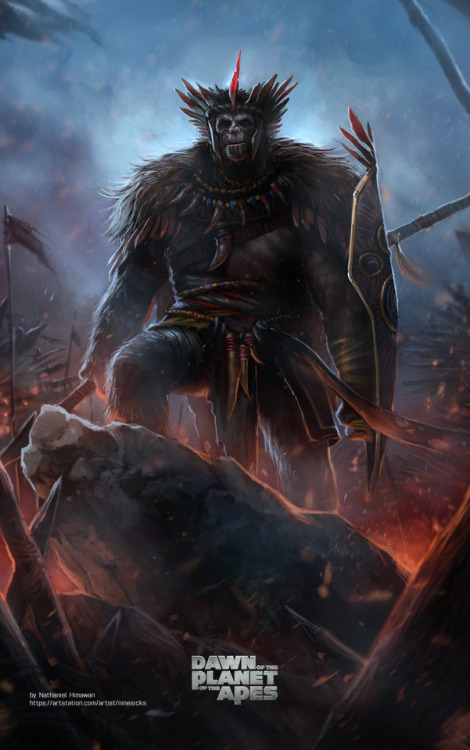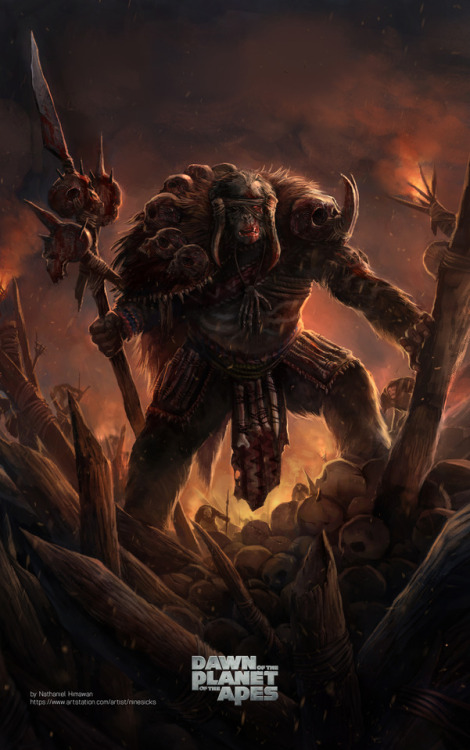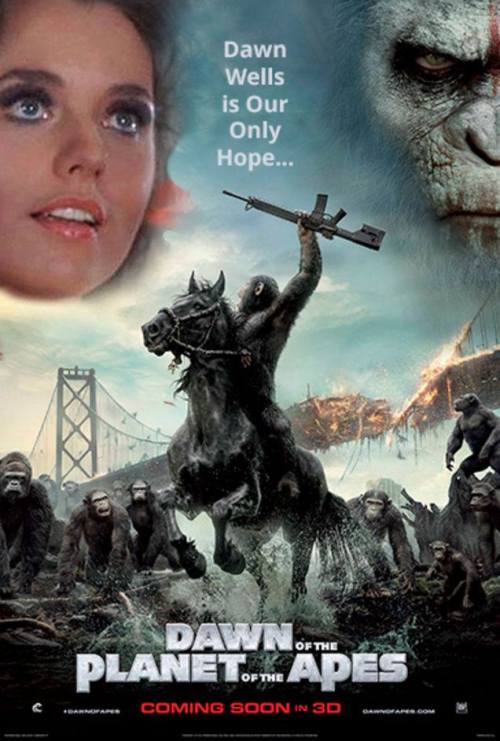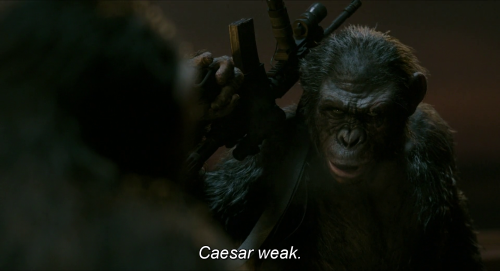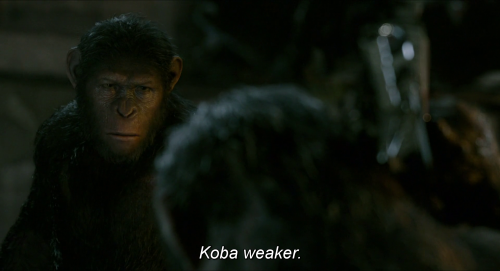#dawn of the planet of the apes
NA DOBRANOC: MAGIA KINA W WYDANIU SPECJALISTÓW ZE STUDIA WETA ORAZ PRODUCENTÓW “DAWN OF THE PLANET OF THE APES” (“EWOLUCJA PLANETY MAŁP”)
I, ma się rozumieć, zespołu utalentowanych aktorów na czele z Andym Serkisem we własnej osobie.
Swoją drogą… Czy wiedzieliście, że Andy Serkis pełnił funkcję konsultanta w czasie produkcji najnowszej, hollywoodzkiej inkarnacji “Godzilli” i osobiście - poprzez technologię montiom capture - wcielił się w króla potworów w kilku kluczowych scenach?
“DAWN OF THE PLANET OF THE APES” (“EWOLUCJA PLANETY MAŁP”) NA NOWYM ZWIASTUNIE

I feel like nobody’s talking about War for the Planet of the Apes. The critics are talking, and the box office is talking, but the people are silent, and I’ve been trying to figure out why. Waris, in my mind, the peak moment of series that has blown past every other competitor in the realm of PG-13, nine figure budget blockbusters. DC, Marvel, Mission ImpossibleandF&F, they all generally fall short of Apes for story, scale and substance. Exceptions exist, like this own year’s Spider-Man: Homecoming andWonder Woman, but on the whole the rest just doesn’t measure up. Not since The Dark Knight has a film of this scope and caliber done so much so well. So why isn’t anyone talking about it? After a lot of thinking, I have a theory. It’s the reason I believe these movies aren’t getting the vocal attention they deserve, and it’s the thing that makes them stand out so starkly from the monochromatic backdrop of modern Hollywood: Planet of the Apes is quiet.
You see it in the calming vistas and beautiful establishing shots. You hear it in those frequent moment of jungle noise and nothing else. The idea of sound and silence is the driving thematic force through the whole trilogy, and with this idea as the series’ philosophical cornerstone, Apes transcends the hollowness of its contemporaries and sets itself in a whole different league.
To really break apart Apes’ use of sound and silence, I want to look at it through a few lenses, and I want to start by talking about silence in the special effects. Before going to see War, I rewatched Dawn with my brother who’d never seen it. When we got to the climax battle, the duel to the death between Caesar and Koba on the tower, and the battleground itself began collapsing beneath them, my brother said, “Huh. That looks expensive.” He was referring of course to the scene itself, the animated amalgamation of girders, pipes and apes, all bending and contorting in a giant computer-generated fireworks display. It looked expensive. And it was.

But the whole movie was expensive. At well over $200 million, Dawn of the Planet of the Apes is in the VIP box for film budgets. The CGI aura emanates from every shot, but it wasn’t until that tower fell that my brother took notice. In a world where every film with a noteworthy effects budget uses it make as many star cruisers and laser blasts, as many explosions and faceless robots, as much noise, as possible, Apes uses its quietly. It builds believable characters in a believable place. And that’s enough.
It’s no secret that Hollywood is suffering from effects-fatigue. It’s the reason Valerianbombed while War did so well financially. Those explosions and collisions that Luc Besson dazzled us with in 1997 do nothing for us now. We expect them, and not excitedly. No matter how many aliens you model on screen, or how many missiles you shoot, the wow factor is gone. So, Matt Reeves went a different way. He took that money and built a world with it. A world that doesn’t look expensive. And he filled that world with a compelling community of characters. When everyone else was competing to see who could make the most noise, Apes created a beautiful silence.
That silence that carries over into the trilogy’s pacing, which is the next piece I want to talk about. While all three have been marketed as action films, none of them really are. Rise is a disaster movie with only one real action scene to its name. Dawnis a post-apocalyptic drama that raises the ante to two fights in the film’s second half. War has elements of a war film, sure, but its equal parts western and prison story at the same time. Every chapter is a distinct piece. That’s what happens when the narrative dictates the franchise, instead of the other way around.

Look at the virus subplot in Rise. That virus is the most important plot device in the whole series, bringing about both the rise of ape society and the fall of man, but we only see it on screen to the extent that it affects Caesar. It’s his story after all. The global spread of the disease and the ensuing downfall of civilization is relegated to a motion graphic in the ending credits, which sounds absurd, but that’s where it belongs for the purposes of the narrative. The same thing happens in Dawn when the human colony contacts Woody Harrelson’s extremist military base. The plotline is there through the whole second chapter, but we don’t see it brought center stage until War.
By deftly weaving these arcs, Apes successfully dodges the trap of cliffhanger and instead creates a compelling, interwoven story. A story with a quiet momentum. It never rushes itself or loses focus, but it also keeps everything in frame. Even the dialog has a calm, peaceful pace. When Caesar speaks in Dawn, we feel how difficult it is. The language doesn’t come naturally, and he constantly struggles to find the right words. The trademark fast banter and witty quips of the blockbuster are replaced with slow, careful dialogue, the noise replaced with silence.
Lastly, I want to talk about how Apes uses silence as a narrative device. From the very beginning, the shifting fortunes of man and ape hinge on their polarized methods of communications. When Caesar learns to speak, it’s through sign language. And when he builds his brotherhood, his family, he uses the same foundation. Everything from school lessons to council meetings are conducted in silence in the ape society. It’s not about being the loudest. It’s about what you have to say.

The humans, on the other hand, shout and riot. The soldiers in Warstart the day with organized battle cries. Gary Oldman controls the chaos of his city in Dawn with a megaphone and a stirring speech. They talk and shout and eventually, all too ironically, lose their voices altogether. All their noise ultimately amounts to nothing, merely embodying the chaos, violence, and madness that defines their downfall. The apes, on the other hand, say something. The difference is, they say it in silence.
There’s a lot more that sets War for the Planet of the Apes and its predecessors apart, like the methodical development of Caesar’s character, and the genre-bending nature of the franchise as a whole. I also know that for all my praise, these movies aren’t perfect. But I do honestly think, at a time when so much in the theater looks so similar and so empty, that there is something unique and important about Planet of the Apes. The fact that I felt more in three lines of subtitles in War than two hours of noise in anything else is incredibly significant. And I hope people start talking about it. Because it matters, it really matters, that there is a movie out there with a $150 million budget that wants people to sit down in a theater and read.
I am a huge fan of the original Planet Of The Apes series from the 70′s. The remake they did with Mark Wahlberg wasn’t half bad. It wasn’t until the recent Rise Of The Planet Of The Apes that the kid in me got excited again for the franchise. It was so well done and quite frankly a great take on the story of genetically altered apes that end up taking over the planet after a virus wipes out humanity.
It would seem that director Matt Reeves is taking it to the next level with Dawn Of The Planet Of The Apes. Everything we have seen has been fantastic and with the latest trailer that has just dropped, I am really buying into the fact that the film is going to be pretty damn great.
A little too foretelling if you ask me, the trailer perfectly captures how I figured the Planet Of The Apes would have been created. And as a long time fan of the series, seeing it happen on the big screen makes me so happy.
20th Century Foxhas Dawn of the Planet of the Apes scheduled for a 3D release on July11th this summer.
I will be there. What about you?
About The Film
A growing nation of genetically evolved apes led by Caesar is threatened by a band of human survivors. They reach a fragile peace, but it proves short-lived, as both sides are brought to the brink of a war that will determine who will emerge as Earth’s dominant species.

Original Article http://bit.ly/1uFZbMe

